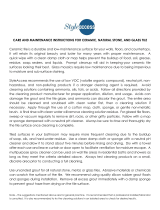Page is loading ...

Routine Care for your Tile
Ceramic tile is one of the most durable and maintenance friendly surfaces you can choose for your walls,
floors, countertops, etc. With proper care & minimum maintenance, it will retain its original beauty and
luster for many years. Generally, all that is necessary to keep your tile looking as good as new is a quick
wipe with a clean damp cloth or mop. Prompt cleanup of spills and regular cleaning will keep your
ceramic tile surfaces looking their best.
If a cleaner is necessary, Florida Tile recommends the use of low VOC (volatile organic compound),
neutral pH, non-hazardous, and non-polluting products.
Glazed tile walls in your home will easily keep their lovely look with simple routine care, just wipe regularly
with a clean damp cloth or sponge. A non-abrasive, neutral cleaner can be used (abrasive cleansers will
cause scratching to shiny tile and polished marble surfaces). Highly polished tile and stone surfaces
should be polished dry with a soft absorbent cloth after cleaning to eliminate the buildup of hard-water
residue and to maintain the high polished finish.
For glazed tile floors, sweep or vacuum regularly to remove dirt and gritty particles. Follow with a mop or
sponge dampened with a neutral pH cleaner. If a cleaner is used, be sure the surface is rinsed thoroughly
with clean water and dried. For textured or uneven tile or stone surfaces, substituting a soft scrub brush
or white nylon scrub pad for the mop or sponge will quicken the cleaning process. Unglazed tile floors and
porcelain tile floors can also be maintained in this same manner.
Tiled surfaces in your bathroom may require a more thorough routine cleaning because of a build-up of
soap scum, body oils or hard-water stains. Use a clean, damp cloth, or sponge with a neutral pH cleaner,
allowing it to stand about five minutes before rinsing and drying. Specialty bathroom cleaners may also be
used (always test first). Clean shower regularly with the appropriate tile and stone cleaner. Dry with a
towel after each use and leave curtain or door open between showers to allow for maximum ventilation
and moisture escape.
Heavy Duty Cleaning
For high traffic areas or when tile has been neglected for a long time, heavy-duty cleaning may be
required.
Glazed walls and countertops should be cleaned with an alkaline-based cleaner (high pH, non-acidic).
Use a white nylon scrub pad, followed by a clean water rinse. Poultice may be used in combination with
any appropriate cleaner, if needed, to restore seriously soiled areas. Poultice is a very fine powder that
serves as a mild abrasive, yet cannot cause scratching to even the most delicate glazed tile and polished
marble surfaces. Unglazed tile and natural stone can be treated in the same manner as glazed when
heavy-duty cleaning is required. Once the tile or stone has been effectively restored and is dry, it is
recommended that the appropriate sealer be applied to protect from staining and ease ongoing
maintenance.
To clean badly soiled countertops, an appropriate alkaline cleaner is recommended. Poultice can be
lightly sprinkled onto the wet cleaner solution and scrubbed with a white nylon scrub pad or medium nylon
scrub brush to facilitate cleaning. Rinse thoroughly. For glazed tile floors, the same products and
procedures are recommended.
For showers, tub surrounds, or other wet areas, light acidic cleaners are recommended to remove hard
water mineral deposits. These acidic cleaners are not recommended on acid-sensitive surfaces such as
metallic glazes or polished marble. For acid-sensitive surfaces, a neutral or alkaline cleaner, used in

combination with Poultice is recommended. Never use harsh acids such as hydrochloric (muriatic) or
hydrofluoric, as these acids, and even the acid fumes, can cause damage to tile, stone, grout, humans
and pets! The accepted acids (use sparingly) for homeowners use are mild citric, sulfamic and
phosphoric. Always test first for desired results.
Do’s and Don’ts
Do use a grout joint. Due to inherent size variations in porcelain and ceramic floor tiles, a grout
joint must be used. Your installer will be able to recommend a suitable grout joint for the product
you’ve selected
Do regularly apply a water based penetrating sealer on all natural stone products
Always do a small test with sealers & cleaners to insure desired results
Do use a sealer on grout joints; except for 100% solid epoxy grout
Do read and follow label directions for all cleaners and sealers
Do not combine ammonia and household bleaches
Do not use harsh cleaning agents such as steel wool pads or strong acids, which can scratch or
damage the surface of your tile
Do not use a cleaning agent that contains color on unglazed tile, natural stone, or white grout, as
these porous surfaces may absorb the color
Do use only non-abrasive cleaning compound or formula that is recommended for both glass and
tile when cleaning glass tile
Murals, Resins, Glass, Cast Stone Fixtures and Metals
Wipe clean with a damp cloth or sponge using a neutral, non-abrasive cleanser. Be sure any cleaner
residue is removed with a clean water rinse. Clean with alkaline tile cleaner or all-purpose cleaner using a
soft cloth. Rinse with clean water and dry with a soft towel. Cast Stone Fixtures and Cast Decors are pre-
sealed in manufacturing with water based, liquid silicone rubber dispersed sealer. For re-sealing, the
sealing product should also be the same type of sealer for best penetration into existing sealer. For more
detailed information on Glass tile installation and maintenance, visit www.floridatile.com or review the
TCNA (Tile Council of North America) Handbook Guidelines.
/

